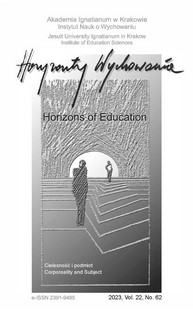Routine, Tact, and Disciple as Components of the Subject’s Identity in the Context of Its Corporeality
Routine, Tact, and Disciple as Components of the Subject’s Identity in the Context of Its Corporeality
Author(s): Anna DrabarekSubject(s): Personality Psychology, Psychology of Self
Published by: Uniwersytet Ignatianum w Krakowie
Keywords: routine; tact; discipline; carnality; identity;
Summary/Abstract: RESEARCH OBJECTIVE: The scientific aim of the article is to present routine, tact and discipline as necessary components of the subject’s identity in the context of his/her corporeality. THE RESEARCH PROBLEM AND METHODS: The research problem is to present the role of routine, tact and discipline forming the subject’s identity based on its somatic features. The method of critical analysis of philosophical and sociological literature was used in the discussion on the subject and his/her corporeality. THE PROCESS OF ARGUMENTATION: The text presents definitions of the terms used, the theoretical background and historical outline, as well as an analysis of the impact of the discussed components on shaping the subject’s identity and his/her social relations. RESEARCH RESULTS: The analysis of the subject’s identity in the context of his/her corporeality indicates that routine, tact and discipline are its essential aspects. Routine creates the continuity of personality and a sense of security. Tact is a state of harmony between the social role, personality traits and the appearance of the subject. Discipline perceived as social and political embeddedness, however, often becomes an investment in the subject’s body. CONCLUSIONS, INNOVATIONS AND RECOMMENDATIONS: Psychological and sociological analyses indicate that the condition of the globalized world is conducive to the occurrence of deep conflicts between various aspects of the same identity. Therefore, in the current discourses on identity, the notion of liquid or protean identity appears very often. In conclusion, it was stated that the currently exposed “liquid identity,” founded primarily on corporeality, loses the significant difference between the private and public spheres. The market trend for a “liquid identity” of a subject that constantly has to change and adapt to the changing conditions of cultural, ethnic, racial and national diversity has turned the private sphere into a public sphere. Intimacy required in actions based on tact has become obsolete.
Journal: Horyzonty Wychowania
- Issue Year: 22/2023
- Issue No: 62
- Page Range: 85-94
- Page Count: 10
- Language: English

